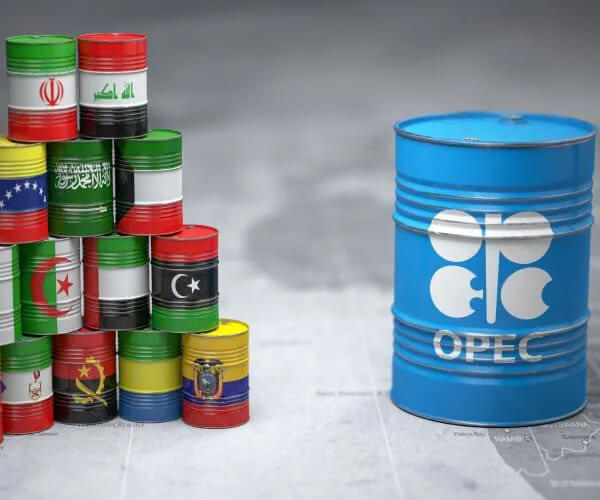1. Higher Consumer Goods
In the past several months, ordinary Americans have faced rampant inflation, including higher prices for groceries, gas, automobiles, dining out, and more. According to the United States Labor Department, the consumer price index increased 0.4 percent for the month, putting the annual inflation rate at 6 percent, leading to shock among ordinary Americans and some investors on Wall Street. Despite the Biden administration passing trillions of dollars in spending and pursuing green energy policies, the average American continues to bear the brunt of the burden, seeing their bank accounts and savings diminish. With the latest announcement by OPEC+ vowing to cut oil production in May, many companies and factories that require oil and plastic for their goods will have no choice but to increase their prices, leading to more inflation and Americans spending more on ordinary necessities. According to experts, to stop inflation, the US government must cut spending, cut government regulations, and allow domestic oil drilling so businesses and factories can have the resources to produce their goods and low costs.
2. U.S. Trade
With the latest announcement by OPEC+, the international economy as a whole will be heavily affected given that many countries that we all rely on for goods and basic necessities will be affected. European countries continue to face high oil prices following Russia’s invasion of Ukraine and consequently cutting off oil production in Europe. As a result, countries like Germany, France, and others have come to rely on OPEC+ nations for oil to keep their economies alive. Many American companies and factories rely on foreign companies to provide them with plastic and other oil-based resources for their production, which will incur more costs in producing domestic and international goods. With the cuts in oil production set to occur in May, cargo shipments from America to Asia and Europe could potentially decrease, given the increasing cost in fuel prices. According to experts, the refusal by the U.S. and Europe to not open up domestic drilling and pursue green energy has led the West to rely heavily on OPEC+ nations and instead leave a significant part of their economy untapped.
3. Higher Gas Prices
With the latest announcement by OPEC+ to cut oil production by more than 1 million barrels a day from May until the end of the year, energy experts say that ordinary Americans will continue to witness higher gas prices. According to the American Automobile Association (AAA), gas prices have risen in America in the past month, with the average price for a gallon of regular gas at $3.50. While the Biden administration has blamed oil companies for price gouging, energy experts say that the President's anti-oil policies and pro-green energy measures have led to higher gasoline prices, given the canceling of oil permits to drill by the Biden White House. Despite the calls by the administration for Americans to purchase expensive electric cars, the actions by OPEC+ will prompt Americans to conserve on driving and buy new gas cars, leading to less economic activity. While Republican-controlled states have expanded their oil drilling, the federal government continues to prevent oil companies from drilling on domestic land to alleviate high gas prices.
4. Aids Anti-American Regimes
The OPEC+ announcement could prompt the U.S. and its allies to remove sanctions against rogue regimes like Iran, Venezuela, and Russia, granting these regimes new economic revenue to support themselves from internal and external conflict. When the U.S. opened its domestic oil production under the Trump administration, the U.S. and its allies relied on American oil while sanctions were in place against Iranian and Russian oil production shipments. Following the Biden administration's move to close domestic oil drilling and support green energy, the U.S. has opened up to granting oil sanctions waiver to Iran. Experts, however, warn that allowing such sanctions waivers provides the Islamic regime to support its terror proxies in the Middle East and provide Russia with military and financial support to continue its war effort against Ukraine. Instead, experts say that the U.S. should continue the Trump administration's domestic oil drilling policy and enact economic sanctions against anti-American regimes that seek to use their oil production for terrorism and expansion.
5. Military Equipment Cost
With the American armed forces relying on oil to support its Air Force, Naval, land vehicles, and bases, the latest announcement by OPEC+ to cut oil production is a significant blow to the Pentagon and defense companies that provide the U.S. military equipment inside and outside America's borders. Following the Biden administration's push for green energy, experts warned that America's national security is at risk, given that countries like China, Iran, Venezuela, and Russia have used their domestic oil production to support their military and foreign expansion. As a result of the oil production cut and future rise in oil prices, many defense companies will have to raise the cost of creating new military weaponry for the U.S., leading to higher military expenses for the Pentagon, which has witnessed its armory supply to decrease since the supporting Ukrainian forces. The increase in oil prices could also affect how America provides its military equipment to its allies in Ukraine, Taiwan, Israel, and other nations that need military support, leading many countries to purchase ample amounts of military weaponry at a higher price.
Related Story: OPEC to Cut Oil Output in Surprise Announcement










